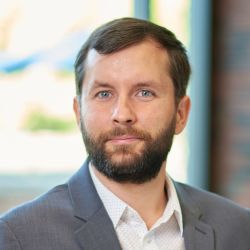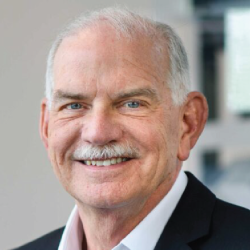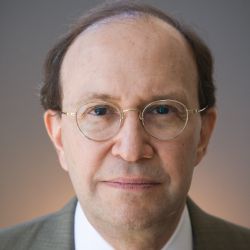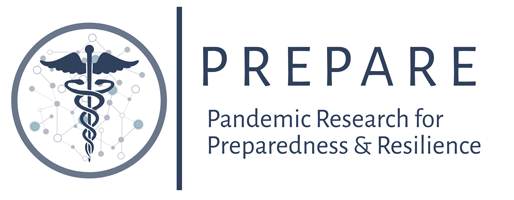Members
PREPARE is a global network of passionate members who drive forward the scientific and public health advances necessary to ready us for the next pandemic. Join us to grow your network, find and share upcoming events, and participate in our workshops!
Enter keywords to search the member names or info cards:
Philip E. Paré

- Rita Lane and Norma Fries Assistant Professor of Electrical and Computer Engineering
Dr. Paré is the Rita Lane and Norma Fries Assistant Professor at the Elmore Family School of Electrical and Computer Engineering at Purdue University. He is a member of the Center for Innovation in Control, Optimization, and Networks (ICON) and is affiliated with the Integrative Data Science Initiative (IDSI) and the Center for Education and Research in Information Assurance and Security (CERIAS). He is also a member of the PIECE (Project for Inclusion in ECE) Committee.
He is interested in bridging the gap between mathematical models and control of epidemic processes over networks (my expertise) and practice. He is always interested in finding more collaborators on the applied/epidemiological/public health side that want to help build that bridge.
Epidemiology and Public Health, Infodemiology, Social Networks, and Scientific Communication, Surveillance & Contact Tracing, Computing & Data Infrastructure, and Privacy, Social, Behavioral, Economic, and Governance
H. Vincent Poor

- Michael Henry Strater University Professor of Electrical and Computer Engineering
Dr. Poor's current research is focused on advances in several fields of rapid technology development, notably wireless networks, and energy systems, and on the fundamentals underlying them, including information theory, machine learning, and network science.
The dramatic increase in demand for new capacity and higher performance has been a major issue in the design and deployment of contemporary wireless networks. The development of these capabilities is severely limited by the scarcity of two of the principal resources in wireless networks: energy and bandwidth. Emerging generations of wireless standards and applications such as the Internet of Things (IoT) are addressing these issues through the use of techniques such as cooperative communications, spectrum sharing, energy harvesting, cloud processing, and densification of infrastructure. One focus of our recent work has addressed the fundamental limits of such techniques through information-theoretic and related analyses of high-reliability and low-latency communications. Another focus has been on addressing the fundamental ability of the physics of the radio channel to provide security in data transmission, and the development of codes and other methods to exploit this capability. A further issue that we are exploring is the use of wireless networks as platforms for machine learning, through the development of federated and decentralized learning algorithms and the study of their interactions with the wireless medium.
His lab's work in energy systems has focused on the smart grid, which has emerged as a key technology for improving the efficiency, efficacy, and security of the distribution and consumption of electric power, particularly for the integration of renewable energy sources such as wind and solar power into the electricity grid. His lab's work in this area has focused on the use of advanced methods from communications and information technology to address several issues arising in this context, including the detection and amelioration of bad data and physical attacks on the grid, the study of privacy issues for both operators and consumers, the characterization of grid resilience through topological data analysis, the development of distributed algorithms for state estimation and control of the grid, and the use of game theory and prospect theory to develop an understanding of the behavior of grid participants in activities such peer-to-peer energy trading.
His lab is also working currently on improved modeling of the spread of COVID-19, and the development of optimal and robust control mechanisms for this spread.
Epidemiology and Public Health, Computational Biology and Bioinformatics, Surveillance & Contact Tracing, Computing & Data Infrastructure, and Privacy
William H. Press

- Professor of Computer Science and Integrative Biology
William H. Press is a computer scientist and computational biologist with broad interests in the physical and biological sciences. An experienced manager in both university and national laboratory settings, he is widely recognized for his academic and research accomplishments.
Press is the Leslie Surginer Professor of Computer Science and Integrative Biology at the University of Texas at Austin. At UT, his affiliations include membership in the Oden Institute for Computational Engineering and Sciences and in the Institute for Cellular and Molecular Biology. Press is also a Senior Fellow (emeritus) at the Los Alamos National Laboratory. From 2009 to 2017, Press was a member of President Obama's Council of Advisors on Science and Technology (PCAST). He is a past (2012-2013) president of the American Association for the Advancement of Science. He is currently the elected Treasurer of the National Academy of Sciences and is a member of the Governing Board of the National Research Council.
In his research career, Press has published more than 160 papers in the areas of computational biology, theoretical astrophysics, cosmology, and computational algorithms. He is the senior author of the Numerical Recipes textbooks on scientific computing, with more than 400,000 hardcover copies in print. Elected to the National Academy of Sciences (NAS) in 1994, he became a founding member of NAS's Computer and Information Sciences section in 2000.
Press was for more than two decades Professor of Astronomy and of Physics at Harvard University, during which he served as Department Chair and in various other positions of university service. Earlier, he was an Assistant Professor of Physics at Princeton University, and Richard Chace Tolman Research Fellow in Theoretical Physics at Caltech, where he received his Ph.D. in physics in 1972. His undergraduate degree was from Harvard in 1969.
Press' research lies at the interface between computer science and computational biology. Recent work includes the development of an error-correcting code (ECC) for massive data storage in engineered DNA. Press and his students collaborate with the lab of Professor Ilya Finkelstein on platforms for massively parallel experiments on DNA-protein binding.


